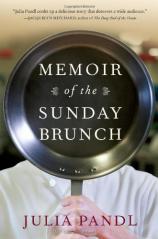Reading Group Guide
Discussion Questions
Memoir of the Sunday Brunch

1. In MEMOIR OF THE SUNDAY BRUNCH, author Julia Pandl uses a very conversational tone, with the intended effect being that of being told a story by a friend. Do you feel that she succeeds? Did you "like" the woman telling the story? Can you think of other books that employ the same technique?
2. Have you ever worked in the "service" industry (jobs such as waitstaff or clerk), where you had to deal with the public? If so, how closely did your experiences parallel those of Julia Pandl? How do you think you would have responded to customers under the circumstances she describes?
3. In her memoir, Julia Pandl deals with the issue of children becoming caregivers to their aging parents. As the youngest, do you feel she assumed a different caregiver role from her siblings? What do you think you would have done under similar circumstances?
4. Julia Pandl writes with great humor and warmth about the experiences she had while working in her family's restaurant business. Do you sense that her siblings would have told their stories with the same lightness, or do you think it would be natural for many children to be resentful of being required to work so hard without full compensation? What was your own experience?
5. In her memoir, Pandl takes the reader behind the scenes and into the kitchen of a family-style, family-run restaurant. Did anything you read in her story cause you to wonder about what is going on out of sight of the customers in some of the restaurants you visit? Did her story give you a new or even perhaps increased appreciation for people who work in restaurants?
6. Julia Pandl notes that there are almost no pictures extant of her as a baby, whereas there are many more of her older siblings, a reflection perhaps of her place in the birth order. How do you think birth order affects the relationship between parent and child? How great a part do you think it played in the relationship that developed between Julia and her father, George?
7. What do you sense was the nature of the relationship the author had with her mother, Terry? In the memoir, Terry seems to take a "back seat" to her husband. Do you think this was because she was not involved in the day-to-day operation of the family restaurant, or do you think she chose to make her presence felt in other ways within the family? In what ways do you think her presence was most strongly felt?
8. Though not a "confessional" style memoir, Julia Pandl's narrative does contain anecdotes about misbehavior and occasional indiscretions involving alcohol and recreational drugs. Do you think less of the author for revealing these actions? Do you relate to them at all yourself?
9. Pandl and her siblings were raised in the Catholic faith, with her mother depicted as being much more involved with the church than her father. Do you think this is typical? How important do you think religion was in the Pandl household? Would you have felt comfortable with a similar spiritual upbringing?
10. Though ostensibly a story about working in the family business, the memoir is at heart a story about the love that develops between a daughter and her father, and about the way she learns about life from him. Did you connect with this theme on a personal level? If you were writing your own memoir, one dealing with the relationship that developed between you and your parents, do you feel it would have been as positive and up-lifting as the one described in Pandl's book?
11. Having read the story of the Pandl restaurant, closed now for several years, do you wish you could have been there during one of the Sunday brunches? If so, what would you want to say to the young girl struggling to make the perfect pancake?
Memoir of the Sunday Brunch
- Publication Date: November 13, 2012
- Genres: Nonfiction
- Paperback: 256 pages
- Publisher: Algonquin Books
- ISBN-10: 161620172X
- ISBN-13: 9781616201722







